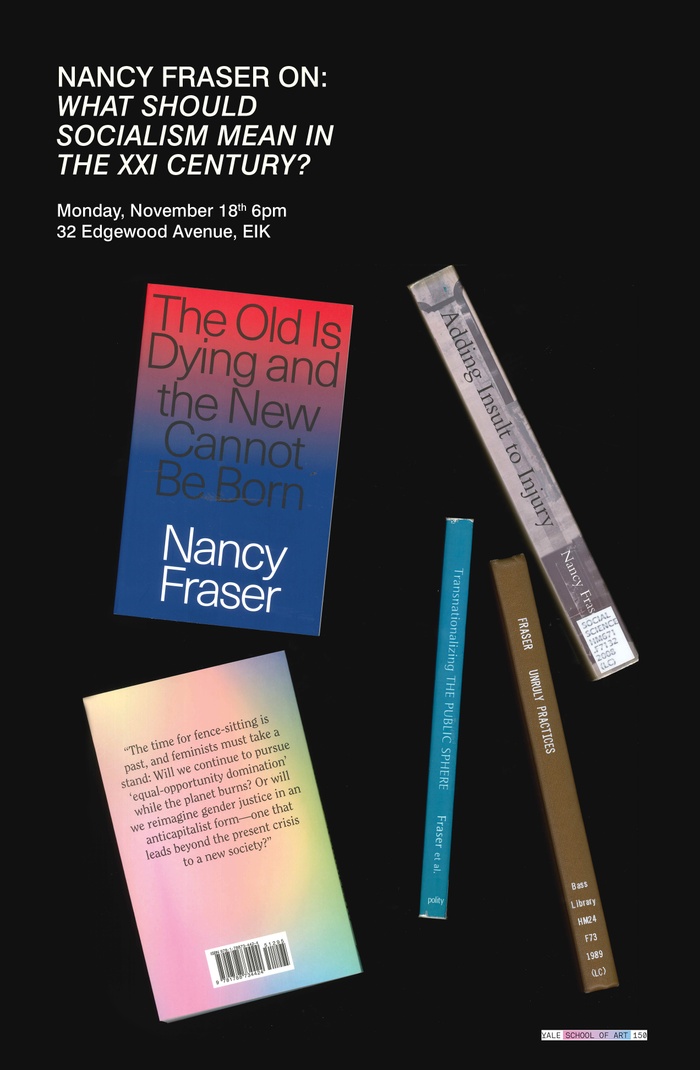Editor details
Last edited by: Lindsey Mancini
Edit access: Everybody
Hosted in conjunction with the public lectures organized by the Yale School of Art in tandem with its 150th anniversary and its status as a co-educational professional school of art, critical theorist Nancy Fraser will deliver a public lecture on November 18th on her recent research regarding twenty-first century feminism and feminist militancy, as well as the fractured myth of progressive neoliberal capitalism. In a talk entitled “What should socialism mean in the 21st century?,” Nancy Fraser will consider the resurgence of the term nationally and venture the beginnings of an answer to the question her lecture’s title posits: what does or should “socialism” signify in the present era? The School of Art recognizes the important thinking Nancy Fraser puts forth around the parallel development of feminism and other social movements and the rise of neoliberalism to raise important questions around what equality means today.
For decades the word “socialism” was considered an embarrassment, but today, U.S. politicians such as Bernie Sanders and Alexandria Ocasio-Cortez wear the label of “socialist” proudly and win support, while organizations that espouse the ideology attract new members in droves. “Socialism” as both a political term and sociopolitical theory have returned to contemporary discourse, but how can it be defined or understood in a way that allows for the full realization of socialism’s myriad potentialities? Disclosing the capitalist economy’s contradictory and destructive relation to its “non-economic” background conditions, Fraser contends that socialism must do more than transform the economy. It must also transform the economy’s relation to its background conditions of possibility, especially in its consideration of non- human nature and the gendered work of social reproduction. In short, Fraser asserts, a socialism for the twenty-first century must be eco-feminist, anti-racist, and unquestionably democratic.
Editor details
Last edited by: Lindsey Mancini
Edit access: Everybody
About Nancy Fraser
Nancy Fraser is Henry A. and Louise Loeb Professor at the New School for Social Research, Visiting Research Professor at Dartmouth College, a former Einstein fellow at the John F. Kennedy Institute of Freie Universität in Berlin, and holder of an international research chair at the Collège d’études mondiales in Paris. Trained as a philosopher, she specializes in critical social theory and political philosophy. Her newest books are Feminism for the 99%: A Manifesto, coauthored with Cinzia Arruzza and Tithi Bhattacharya (Verso, 2019 and in twenty other languages); The Old is Dying (Verso, 2019); and Capitalism: A Conversation in Critical Theory, coauthored with Rahel Jaeggi (Polity Press 2018).
Fraser has theorized capitalism’s relation to racial oppression, social reproduction, ecological crisis, feminist movements, and the rise of rightwing populism in a series of linked essays in New Left Review, Critical Historical Studies, American Affairs, and in Fortunes of Feminism: From State-Managed Capitalism to Neoliberal Crisis (2013). Her other books include Transnationalizing the Public Sphere (2014); Scales of Justice (2008); Adding Insult to Injury: Nancy Fraser Debates her Critics (2008); Redistribution or Recognition? A Political-Philosophical Exchange, with Axel Honneth (2003); Justice Interruptus (1997); and Unruly Practices (1989). Fraser’s work has been translated into more than twenty languages and was cited twice by the Brazilian Supreme Court in decisions upholding marriage equality and affirmative action. A “Chevalier” of the French Legion of Honor, a Member of the American Academy of Arts and Sciences, and past President of the American Philosophical Association, Eastern Division, Fraser has received six honorary degrees, the Nessim Habif World Prize from the University of Geneva, the Havens/Wright Center Lifetime Award for Contribution to Critical Scholarship from the University of Wisconsin, and the Alfred Schutz Prize in Social Philosophy from the American Philosophical Association.
Editor details
Last edited by: Lindsey Mancini
Edit access: Everybody
Editor details
Last edited by: Lindsey Mancini
Edit access: Everybody

